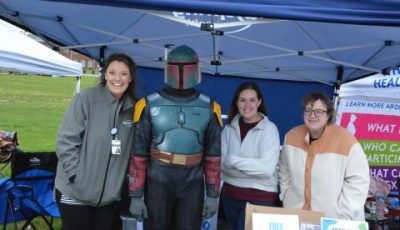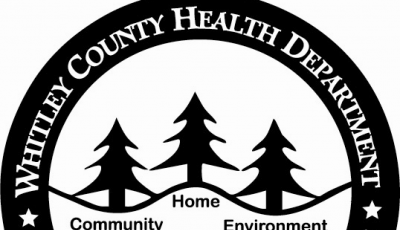Whitley Co. Health Dept. needs public’s help to win colon cancer screening photo contest
The Whitley County Health Department would like your help to win a contest that is promoting colon cancer screening awareness.

Williamsburg Mayor Roddy Harrison joined the staff at the Whitley County Health Department Thursday to kick off National Colorectal Cancer Awareness Month. This photo is entered in the Kentucky Cancer Program’s 2019 Facebook photo contest in support of the effort to promote colon cancer screening awareness.
March is National Colorectal Cancer Awareness Month, and on March 7, members of the health department gathered outside their office in Williamsburg along with Mayor Roddy Harrison, who threw a toilet paper bouquet for a photo that is entered in the contest.
The photo is being entered in the Kentucky Cancer Program’s 2019 Facebook Photo Contest, which is themed “Dress in Blue Day Photographs.”
To vote, go to the Kentucky Cancer Program’s Facebook page at www.facebook.com/KCPEast from April 2-9, select the Cumberland Valley photo album, and like the Whitley County Health Department’s photo.
The winning entry in the photo contest will receive a plaque.
Whitley County Health Department Health Educator Kathy Lay noted the more important thing is promoting colon cancer awareness.
“All Kentuckians age 50 and older should get regular colon cancer checks, or earlier if the family history has a greater risk. Colorectal cancer is the second leading cause of cancer death in the United States, but it can be prevented because screening helps find precancerous polyps so they can be removed before they turn to cancer. Screening can also find colorectal cancer early, when treatment is most effect,” Lay noted.
Early colon cancer usually has no symptoms.
Your chances of getting colorectal cancer are higher if you or a close relative has had colon polyps or colon cancer, or if you have an inflammatory bowel disease or certain hereditary conditions.
Statistics show that nine out of 10 cancers may be prevented or cured with regular checks, and that at least 60 percent of colon cancer deaths could be prevented if everyone age 50 and older received regular screening.
Most colorectal cancers occur in people with no family history, Lay added.







